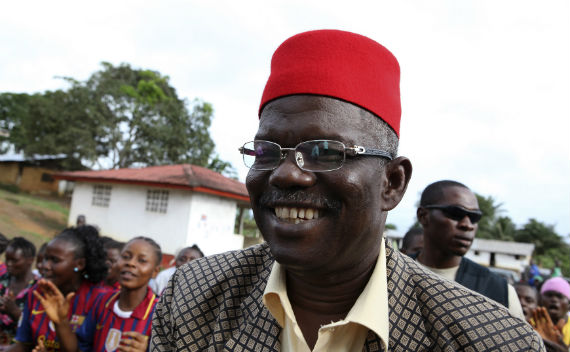Political Deal Likely Guarantees Ellen Sirleaf-Johnson Liberia Presidency
October 18, 2011 11:31 am (EST)
- Post
- Blog posts represent the views of CFR fellows and staff and not those of CFR, which takes no institutional positions.
More on:

The first round of Liberia’s presidential elections left incumbent president Ellen Sirleaf-Johnson with about forty-four percent of the vote. Her principal rival, Winston Tubman (supported by vice presidential candidate footballer and youth idol George Weah) with about thirty-two percent, and Senator Prince Johnson with eleven percent. (While the Liberia National Elections Commission has not issued a final count, most of the polling centers have already reported.) There will be a run-off election between Sirleaf-Johnson and Tubman in early November because no candidate received a constitutionally-mandated majority of the votes.
Sen. Prince Johnson has announced that he will support Sirleaf-Johnson, virtually guaranteeing that she will win the run-off.
Over the past few days, as it has become clear that nobody had won a majority of the votes and that there would be a run-off, Johnson has gloried in his kingmaker role. Though I cannot prove it, almost certainly Sirleaf-Johnson and Prince Johnson did a deal. (Prince Johnson claims he decided to support Sirleaf-Johnson because he believes Tubman supporters want him tried for war crimes.)
If so, Sirleaf-Johnson has chosen to sup with the devil; I hope she has a long spoon.
Prince Johnson comes from Nimba County and has been the standard bearer of the Gio and Mano people. Nimba county is the second largest constituency in Liberia.
He is also a former warlord whose bloodthirstiness is legendary. During the first Liberia civil war he captured chief of state Samuel Doe and oversaw his torture and execution while drinking Budweiser. He had the episode videotaped and posted it around the world; it can still be viewed on YouTube. (You will not find the link here.) Like Sirleaf-Johnson, he was allied with Charles Taylor and later broke with him. During the Sirleaf-Johnson presidency, he has been a fierce critic of her administration.
Prince Johnson claims to have been Born Again and to be reconciled with Doe’s family.
Over the weekend there was sufficient electoral violence in Monrovia to prompt International Criminal Court prosecutor Luis Moreno-Ocampo to warn that “resorting to violence will not be tolerated.”
Whatever the terms of Sirleaf-Johnson’s deal with Prince Johnson, the fact that it virtually guarantees her victory in the run-off probably reduces the likelihood of significant further violence. As I have written before, and as her Nobel Peace Prize attests, Sirleaf-Johnson is more popular outside of Liberia than in it. But a political deal with Prince Johnson – necessary though it probably was – will not burnish her historical reputation.
More on:
 Online Store
Online Store
